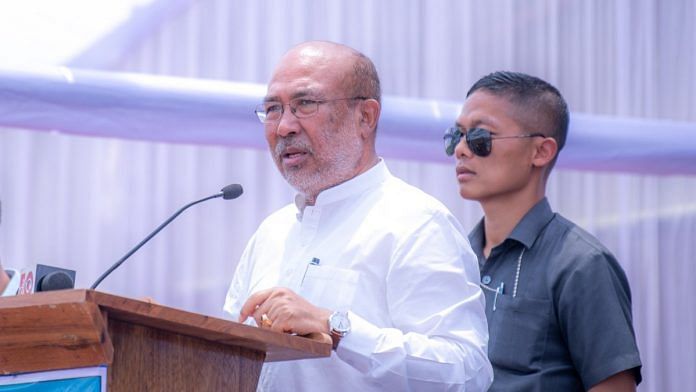New Delhi: Manipur Chief Minister N. Biren Singh is facing an unprecedented crisis on multiple fronts. While ethnic conflicts have exploded to the point that the central government has invoked Article 355 to take over security in the state, Biren Singh is also facing dissent from within his own party, with several MLAs publicly criticising his “authoritarian” leadership style and decision-making.
Trouble began ramping up this Wednesday with incidents of rioting and arson in the wake of a ‘Tribal Solidarity March’ organised in various parts of the state by the All-Tribal Students’ Union Manipur (ATSUM), leading to curfew being imposed in some districts as well as an internet shutdown. As violence continued Thursday, 55 columns of the Army and Assam Rifles were deployed in the state and shoot-at-sight orders issued for “extreme cases”.
Meanwhile, Union Home Minister Amit Shah presided over two video conference meetings with CM Biren Singh, the state director general of police, and other senior officials to review the security situation Thursday. Subsequently, Article 355 of the Constitution was promulgated and former Central Reserve Police Force (CRPF) DG Kuldiep Singh appointed as Manipur state security advisor.
The immediate trigger for the latest round of agitations was a 14 April Manipur High Court order asking the government to consider the dominant Meitei community’s decade-old demand to be included in the Scheduled Tribe (ST) list. The state’s 34 tribal groups, which primarily come under the umbrella of the Kuki and Naga tribes, are vociferously opposed to the idea, arguing that the Meitei already enjoy an advantage in the state.
The latest conflagration, though, has been building up for a while. The reservation issue has just added fuel to the already inflamed tensions between Meitei and Kuki groups, with protests on interrelated issues erupting several times over the past few months.
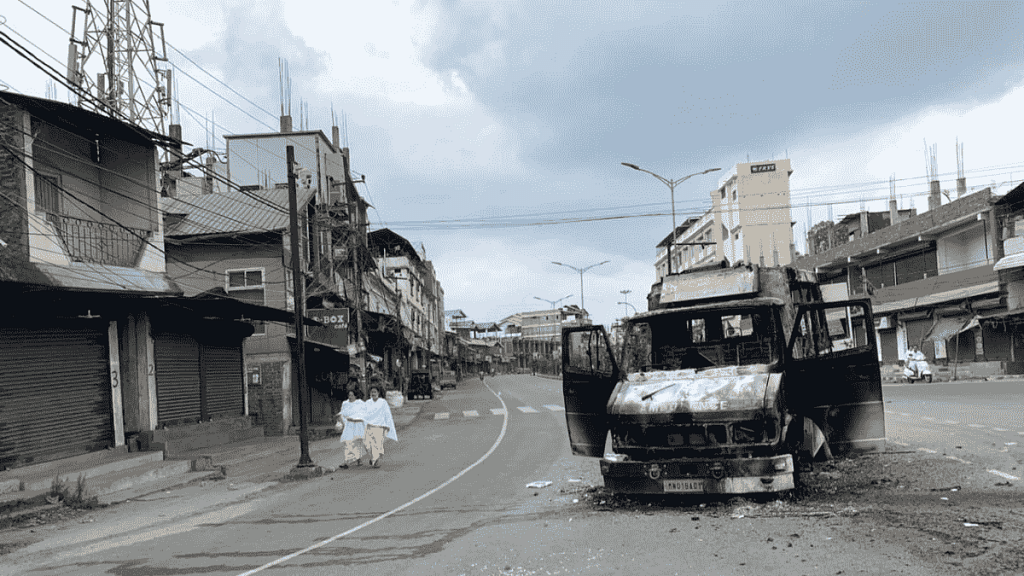
Each time, the state’s Biren Singh-led BJP government has been in the line of fire too.
In March, for instance, the government faced protests from both sides. While Meitei groups demonstrated outside the CM’s home over a purported influx of “outsiders” from Myanmar, members of tribal students’ bodies clashed with security forces in Kangpokpi district over a government drive to evict “encroachers” from reserved forest land.
Last week, the CM had to cancel his visit to Churachandpur district, which saw a flare-up of violence after tribal bodies called for a shutdown over evictions. Pagin Haokip, the chairperson of the Indigenous Tribal Leaders Forum (ITLF), a tribal umbrella body, had told ThePrint then that the tribal groups were ready to talk with the central government, but not the state’s leadership, in which they had “lost hope”.
Amid all of this, N. Biren Singh is facing rumblings of discontent from within the party, too, with no fewer than four MLAs resigning from their official posts within a 10-day period from 13 April to 23 April.
On top of this, a group of BJP MLAs from the Kuki community visited Delhi last month, ostensibly to voice their complaints against the CM to the party high command.
Party sources told ThePrint that the delegation requested the BJP high command to send a stern message to Biren Singh to appropriately address the mounting public pressure in the hill districts, including over the eviction drive, a campaign against poppy growers, and the withdrawal of a ceasefire agreement with two Kuki insurgent groups.
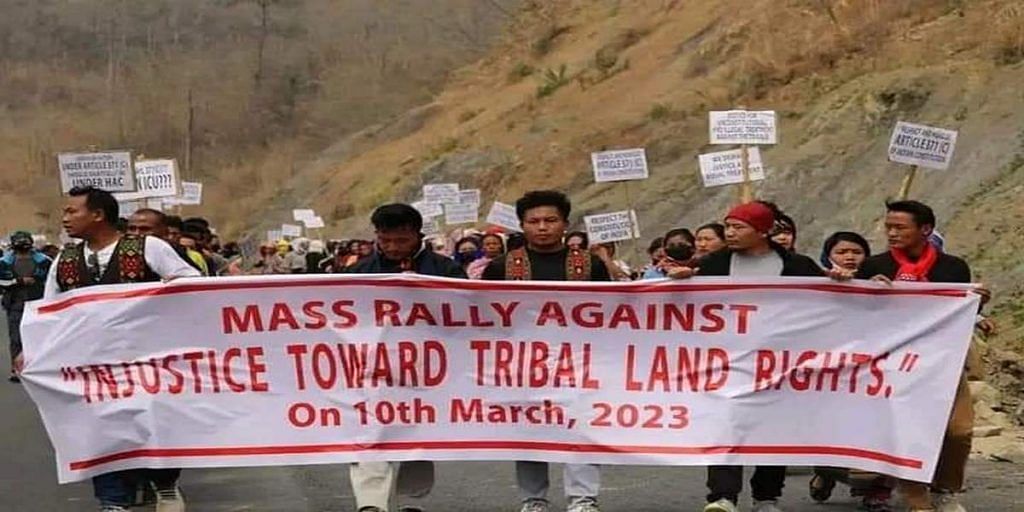
Speaking to ThePrint, National People’s Party (NPP) leader Yumnam Joykumar Singh, who was deputy CM in the previous Biren Singh dispensation, said the government should “handle sensitive issues better”.
“The message should not go that the government is not protecting the interests of the Kuki tribes,” said Joykumar Singh, whose party is no longer in coalition with the BJP but has extended support to it.
Meanwhile, in a video posted on Twitter Thursday, the embattled CM blamed the present law-and-order situation on a “communication gap” and “prevailing misunderstandings between two sections of our society”.
My humble appeal to everyone in the State to cooperate with the Government in maintaining peace & harmony at this hour. pic.twitter.com/qViqbuflWr
— N.Biren Singh (@NBirenSingh) May 4, 2023
He also offered assurances that the “long-term grievances of communities would be suitably addressed in due course with the consultation of the people”, and appealed to residents that they should not let “vested interests” disturb the state’s “communal harmony”.
Here is a closer look at the evolution of some of the major challenges confronting Biren Singh, from Kuki grievances to rebellion within the party.
Reservation imbroglio, govt ‘silence’
The latest outbreak of protests in Manipur was sparked after a single-judge high court bench, on 14 April, directed the state government to consider the inclusion of Meitei in the Scheduled Tribe list and to forward its recommendation to the Union Ministry of Home Affairs (MHA).
The order, which gave a fillip to the 12-year demand of the community for inclusion in the ST list, has deepened the existing fault lines between the plain-dwelling Meitei and the hill tribes.
The ethnic Meitei community, which is primarily Hindu and consists of several groups, argues that they were recognised as a tribe before the merger of the princely state of Manipur with the Indian union in 1949, and thus deserve ST status.
However, the move has been met with opposition from the state’s Kuki and Naga hill tribes, which fear that the Meitei’s economic advancement and political dominance could compromise their own reservation.
The Meitei reportedly comprise about 53 per cent of Manipur’s population and are concentrated in the Imphal Valley region. They are dominant in 40 out of the state’s 60 assembly seats. The tribes, on the other hand, comprise about 40 per cent of the state’s population and primarily inhabit the sparsely-populated hill districts of Kangpokpi, Churachandpur, Tamenglong, Chandel, Ukhrul, and Senapati.
Calling for the ‘Tribal Solidarity March’ earlier this week, ATSUM had said in a statement that the purpose was to protest against the “persistent demand of Meitei community for inclusion in ST category and the support to this by valley legislators” and to rally for more protection of tribal rights.
Janghaolun Haokip of the Kuki Inpi Manipur (KIM), the apex community organisation in the state, told ThePrint the Kukis were angry because they did not have the same opportunities and resources as the Meiteis.
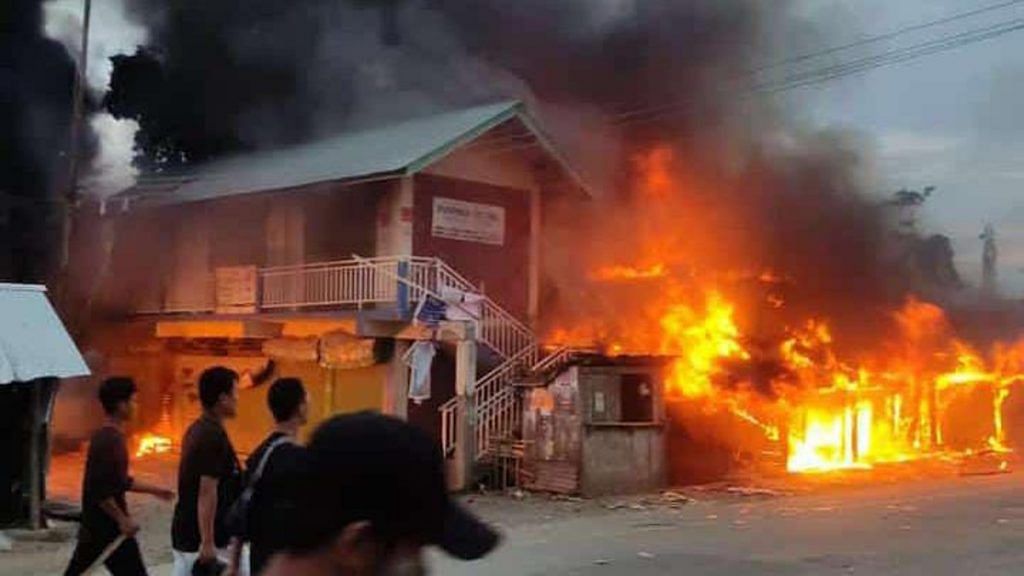
“The Kuki community has fewer economic opportunities and is not as well placed as the Meitei. If the Meitei were included in the tribals list’, there would be very few opportunities left for tribals. There is no logic in including an advanced community into the tribals’ list. They are already in the OBC list,” he said.
Prof Nameirakpam Bijen Meetei of the Political Science Department at Manipur University said that the government’s silence on the issue so far has exacerbated the issue.
“Meitei groups already enjoy reservations under the OBC and SC categories. The government now has two options — either they can ask the court to reconsider its judgment, or convince both communities of a better alternative. But this protest can aggravate alienation of the Kuki community,” he said.
NPP leader Joykumar Singh also said that the government should address the issue directly.
“The high court has asked only for recommendations, it’s entirely on the state government to accept or reject the order of including Meitei into the ST category. There are several factors which have annoyed Kuki tribes, and the government should look and address the issue with more concern,” he added.
Eviction drive, poppy row, church demolition
The violence last week in Kuki-dominated Churachandpur was the culmination of months of tribal outrage over a government “eviction drive” that was purportedly initiated to save protected forest land.
There are also fears that more tribal areas might be declared as protected forest in the wake of a government land survey, putting local communities at risk of eviction.
This matter started heating up on 20 February, when the state government, with the help of police personnel, evicted residents of K. Songjang, a Kuki village in Churachandpur, after serving two notifications to the village chief.
While Kuki bodies like the ITLF had condemned the drive as a “forceful eviction” and said that it targeted legitimate residents, the government had maintained that the village was standing on encroached land of a protected forest.
Since then, the issue has resulted in sporadic anti-government protests from Kuki groups, including the one last week, which resulted in the CM cancelling his trip to Churachandpur.
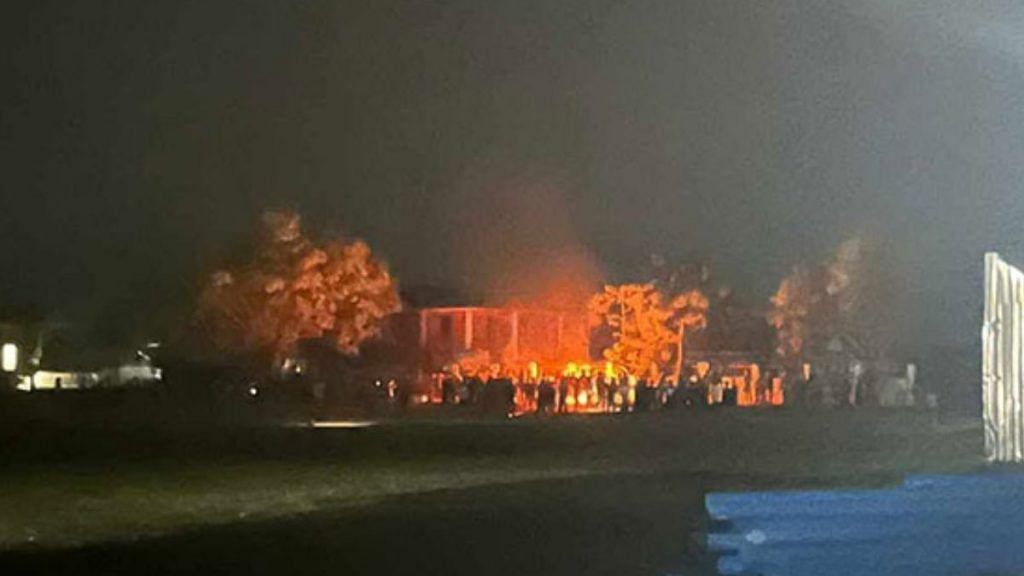
What is also tied in with this issue is the “war on drugs”, which Biren Singh announced in 2018 during his first tenure as CM.
In an in-depth report last June, ThePrint had detailed the issue of vast illegal poppy plantations in the hills of Manipur and the government’s attempts to destroy them.
However, this has become a contentious matter, with Kuki groups claiming that the government’s fingers — and eradication drives — are unfairly directed at the community on this matter.
In March, matters grew even more complicated after clashes broke out in Kangpokpi district following a rally against the anti-encroachment drives.
CM Biren Singh linked this protest to illegal poppy cultivation, claiming that the protesting villagers were encroaching on reserved forests “for poppy plantation and drugs business”.
Shortly thereafter, the Biren Singh government withdrew from ceasefire agreements with two insurgent groups, the Kuki National Army (KNA) and the Zomi Revolutionary Army (ZRA). In a tweet, Biren Singh claimed that these groups were “influencing agitations” in the hill districts after eviction notices were issued to “forest encroachers”.

The government had also alleged that the leadership of these groups was from “outside” the state. A KNO spokesperson had earlier denied these allegations while speaking to ThePrint and had claimed that the Kukis were “the first in line to face the brunt” when it came to land issues.
Another issue that reportedly “hurt sentiments” was the demolition of three churches in Imphal on 11 April on the grounds that they had been built on government land without due permission. The majority of the residents in the five hill districts are Christians. The ITLF had condemned this incident, saying that the government had no respect for the Christian faith.
‘Such measures can worsen alienation, insurgency’
So far, the central government seemed to have supported the Biren Singh dispensation’s drive against encroachment even as the unrest raged.
Last Sunday, for instance, Union Environment Minister Bhupendra Yadav reportedly said during a visit to Manipur that protecting forest land was the “sole responsibility of the state government”.
However, the Ministry of Home Affairs has been more circumspect. The central government has not withdrawn from the tripartite ceasefire agreement with the two insurgent Kuki groups, for instance.
Party sources told ThePrint that when Biren Singh met Home Minister Amit Shah in March, the latter advised him to navigate the ceasefire issue “without hurting the sentiments of the Kukis”.
But speaking on condition of anonymity, a BJP MLA from the Kuki community told ThePrint that some damage had already been done.
While he acknowledged the prevalence of poppy cultivation in some villages, he said not enough had been done to avoid portraying the entire Kuki tribe as involved in drug production or land encroachment.
“The state government has the right to take action against the drug mafia, but without consultation and proper communication to tribals, this type of measure can create more alienation and insurgency,” he said.
Notably, a delegation of Kuki BJP MLAs — the state has 11 in all — visited Delhi last month. Party sources said that these MLAs had given feedback to the BJP high command that the state government withdrawing from ceasefire agreement with two Kuki insurgent groups had not gone down well in the community.
Rebellions, allegations of ‘autocratic’ leadership
Trouble has been brewing for Biren Singh within the party, which won a second term in 2022, with a stream of resignations that began with Thokchom Radheshyam Singh on 13 April.
A former adviser to Biren Singh, he wrote in his resignation letter that he was never given any responsibility, never had an audience with the CM and was “never part of any decision-making or meeting”.
More resignations followed. On 17 April, Langthabal MLA Karam Shyam resigned as chairman of Tourism Corporation of Manipur Limited; Paonam Brojen stepped down as chairman of Manipur Development Society on 20 April; Khwairakpam Raghumani Singh, a former IAS officer, put in his papers as chairman of the Manipur Renewable Energy Development Agency on 24 April.
All the four BJP MLAs have aired their grievances in public.
Like Thokchom Radheshyam, Langthabal MLA Karam Shyam said in his resignation letter that he wasn’t given any responsibilities. While BJP MLA Paonam Brojen cited “personal reasons” while stepping down, he later made his grievances public through a video message in which he claimed that the government had not cleared bills for several road development projects in the state.
In a cryptic Facebook post hours after his resignation, Raghumani Singh seemingly took potshots at the BJP state leadership.
“The BJP is a party that stands against family politics, truly believes in consultative decision-making at all levels and not in a show run by only 2/3 people,” he posted without taking names.
Karam Shyam and Thokchom Radheshyam Singh had served as ministers in the previous N. Biren Singh-led BJP government. Biren Singh removed both from the new ministry, and it is said to be one of the reasons both BJP MLAs are annoyed with the chief minister.
One of these disgruntled MLAs, asking not to be named, said the underlying issue was one of “democracy” in the party and government.
“Only two people are running the entire government and party in Manipur — the chief minister and his son-in-law Rajkumar Imo Singh,” he claimed
“Rajkumar threatened MLAs with action if they spoke before the media against Biren Singh. They keep watch on the movement of MLAs; we have to inform and take permission to go out from the state like we did during school days. The government doesn’t allow work in those MLA constituencies who give an alternative viewpoint,” he further alleged.
Although the BJP high command has not paid much heed to complaints against Biren Singh, party Northeast in-charge Sambit Patra visited Manipur to take stock of the situation last week.
When asked about party leaders complaining about the CM, BJP state president Sharda Devi said that a “difference of opinion” did not mean that the MLAs in question were against the government.
Notably, during Biren Singh’s first term as CM, a similar revolt took place when the NPP withdrew its support, alleging that he was running the government in an autocratic manner.
Although Biren Singh’s clear majority of 32 seats in the 2022 mandate poses no threat to the stability of the government, as it enjoys the support of the NPP and others, the upcoming Lok Sabha election in a year and the ethnic community’s protests and resentment within the party can challenge Biren Singh’s grip on administration and the stability of the state.
(Edited by Asavari Singh)
Also read: Flow of refugees from Myanmar reignites ethnic strains in insurgency-battered Manipur


